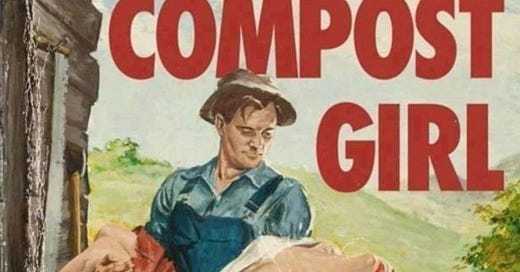Relax, you can't really get compost "wrong."
A reassuring missive about why you can't really mess up your pile.
First, some cute news: Substack featured my Halloween edition of The Rot in one of their round-ups. Lots of other cool newsletters in there, too. :)
It’s been a minute since I’ve written. Fall is planting season in Los Angeles, and I’ve been unexpectedly busy in my neighborhood garden. The organization I was volunteering for just asked to hire me part-time and I now, for the first time ever, actually make (a little) money from working with compost. I lead the weekly volunteer crew, teach classes, and coordinate with a handful of my neighborhood restaurants to compost their food scraps. I also started working with a local women’s shelter, where the women have requested to learn about vermicomposting for their own small garden. A lot of the compost I was making as a volunteer used to go them, and we’ve gotten to know and like each other over the months. This whole “composting” endeavor has expanded beyond my wildest dreams—but, inevitably, it has also left me with a little less time for writing.
The one thing that continues to stand out as I teach more and more people about compost is how little most of my peers know about, for lack of a better word, “nature.” After explaining to a group of 50 corporate employees how compost works, one of the women in the crowd remarked in amazement: “Do you mean to tell me that if I just throw my morning banana peel in the backyard, it will start to decay all on its own?” “Yes,” I laughed. “Thats exactly what I’m telling you.” It might seem easy to make fun of this woman (“how stupid!” etc), but this woman was not stupid at all—in fact, she was smart, charming, and warm. She was just also an accurate reflection of the amount of information we provide the average kid in America about how the natural world functions, and how alienated our day-to-day lives have become from a simple and enduring relationship with those systems.
For this reason, I think “compost” remains an intimidating proposition to most people. I hear a lot of this anxiety from people in my classes. Most of the available information is filled with numbers and ratios, confusing designations for different materials, and relatively little detail on the basic principles of decay. The fact is: everything rots. It will rot whether you put it in a pile or flat on the ground, it will rot whether you mix it up with other stuff or leave it alone, and it will rot whether you turn it every day or don’t touch it for a whole year. “Compost” is just there to help things rot faster and perhaps with less smells or while attracting less animals. It’s a label that’s entirely about human convenience. Nothing more.
When I teach people about compost, I tell them to throw the spreadsheets and ratios out the window. Just put some food scraps and some dead leaves in a pile in a corner of your yard, and watch what happens. Smell it, look at it, and touch it. Compost, like a lot of other things, is a practice that takes place over time—and you can develop a relationship to your pile, so that it meets your specific and particular needs. Do you need your compost for a garden? Then you may want to make sure it decays on a timeline. Are you worried about smells because you have neighbors nearby? Then you’ll want to be fastidious about covering your food scraps with lots of leaves and perhaps build an enclosure. Are bears a problem? Then maybe put your compost far from the house. Do you just want to get rid of your food scraps in an environmentally-friendly way? Then you can do pretty much anything you want.
See what I mean?
Spreadsheets and ratios can be wonderful tools for compost if you’re a farmer. They can help you make maximally nutritious compost in the least amount of time and a lot of people I love and admire are very knowledgeable and successful composters for their farms. Not everybody needs to be a scientist about compost, though. You—the person reading this—probably do not. That’s why the first thing I tell each of my classes is: “r e l a x.” Life is tough enough. Compost never should be.
Happy Halloween,
Love,
Cass





I am grateful you are spreading the word and showing people about the ease and importance of composting. I love the idea of healthy soil in the garden plot or anywhere, really, but I am especially appreciative of taking compost waste out of our dumping sites where it doesn’t get used properly and creates runoff problems.
My ‘thing’ is composting after death. When I look at a cemetery I see misuse of resources like endless cement, burial boxes that won’t decompose and a lot of waste. I am happy to see people are realizing bodies can be composted and what better way to ‘give back’ and honor the dead? I just wish it was moving at a faster pace. A reminder that cremation is not environmentally better. Composting is the best on all counts.
very reassuring <3